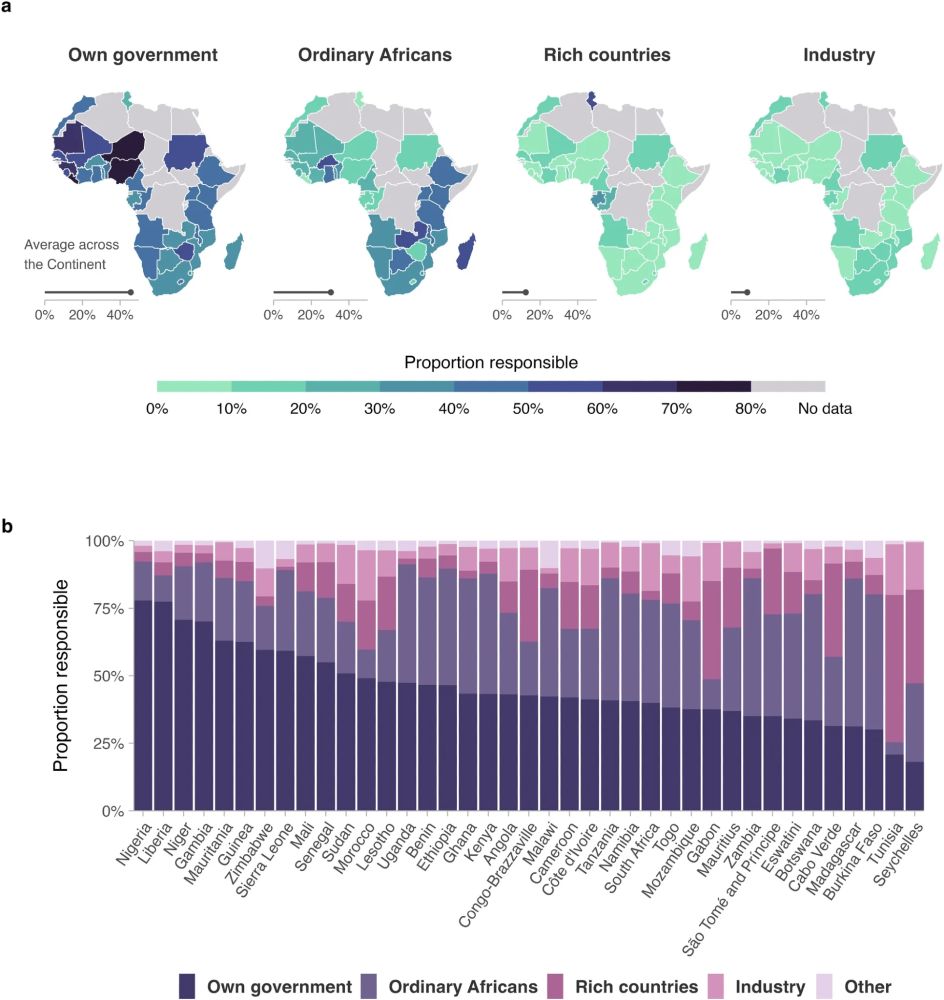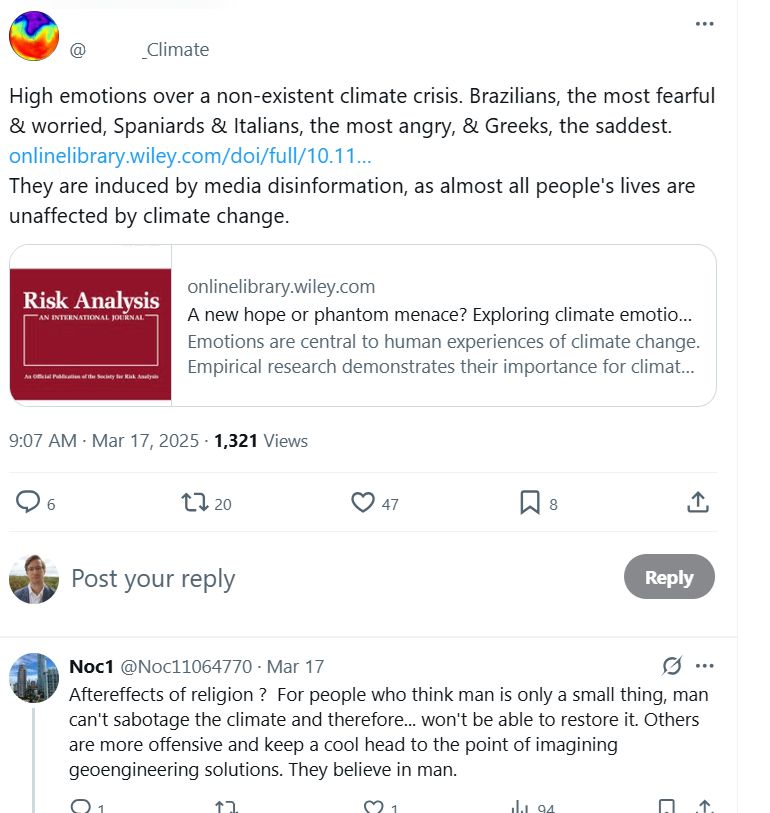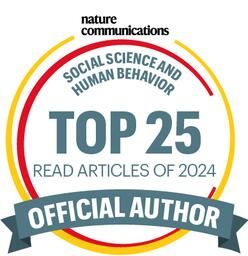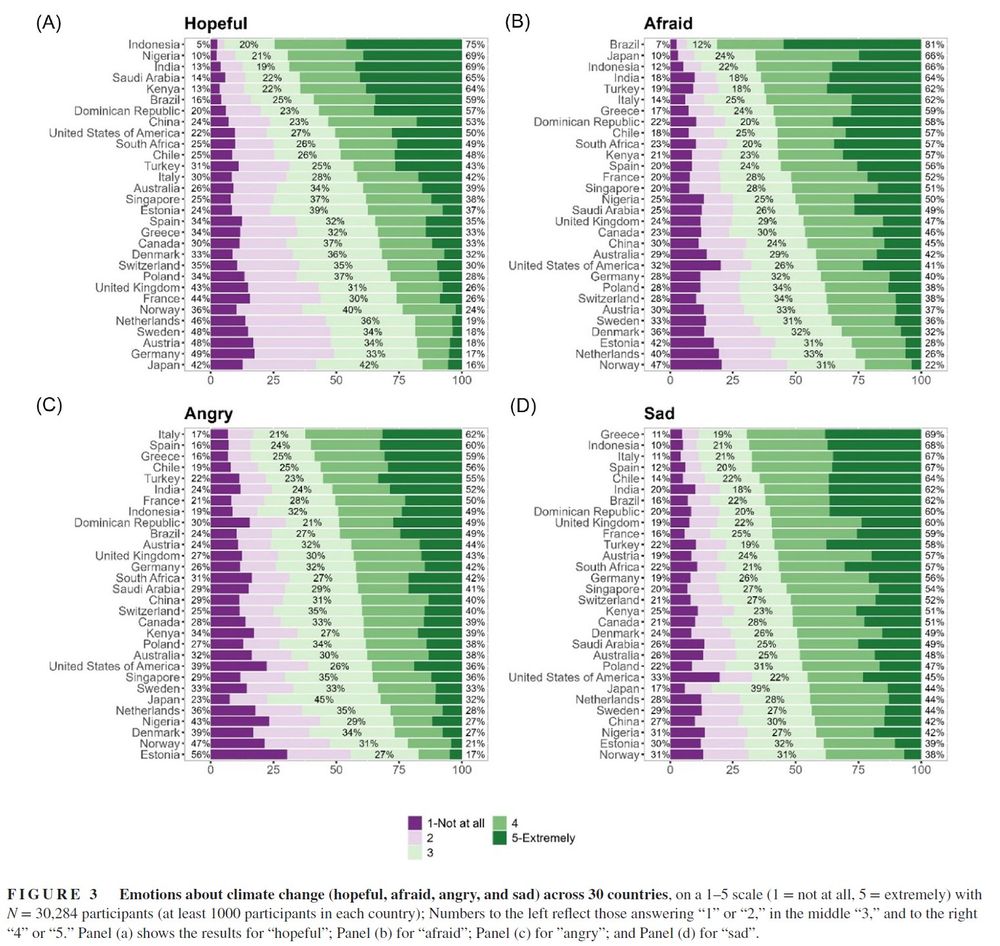
Chad M. Baum
@chadmbaum.bsky.social
Assistant Professor @AarhusUni | Researcher of Public Perceptions of Climate Technologies | Carbon Dioxide Removal | Food + Agriculture | Geoengineering | Environmental Justice | All views my own
Happy to announce I have joined the Editorial Board at Energy Research and Social Science! 🌍💡
#ERSS has long been one of my favorite journals, and I thank @sovacool.bsky.social et al. for the opportunity.
I look forward to seeing your best articles soon 👇
www.sciencedirect.com/journal/ener...
#ERSS has long been one of my favorite journals, and I thank @sovacool.bsky.social et al. for the opportunity.
I look forward to seeing your best articles soon 👇
www.sciencedirect.com/journal/ener...

September 17, 2025 at 7:41 AM
Happy to announce I have joined the Editorial Board at Energy Research and Social Science! 🌍💡
#ERSS has long been one of my favorite journals, and I thank @sovacool.bsky.social et al. for the opportunity.
I look forward to seeing your best articles soon 👇
www.sciencedirect.com/journal/ener...
#ERSS has long been one of my favorite journals, and I thank @sovacool.bsky.social et al. for the opportunity.
I look forward to seeing your best articles soon 👇
www.sciencedirect.com/journal/ener...
Majority of African citizens (i) have not heard of climate change and (ii) place main responsibility for climate action on own governments or ordinary citizens-not historical emitters.
Data from Afrobarometer (2021-23), N=53,444, in 39 countries
🔗https://www.nature.com/articles/s43247-025-02244-x
Data from Afrobarometer (2021-23), N=53,444, in 39 countries
🔗https://www.nature.com/articles/s43247-025-02244-x

April 28, 2025 at 8:18 AM
Majority of African citizens (i) have not heard of climate change and (ii) place main responsibility for climate action on own governments or ordinary citizens-not historical emitters.
Data from Afrobarometer (2021-23), N=53,444, in 39 countries
🔗https://www.nature.com/articles/s43247-025-02244-x
Data from Afrobarometer (2021-23), N=53,444, in 39 countries
🔗https://www.nature.com/articles/s43247-025-02244-x
The old site really has become a cesspool.
I happened to see that this is one of the more shared tweets that links to our new article 🗣️💩 Trafficking in blatant climate denial, masquerading as scientific independence.
Much happier to be over here! 💙🌈
I happened to see that this is one of the more shared tweets that links to our new article 🗣️💩 Trafficking in blatant climate denial, masquerading as scientific independence.
Much happier to be over here! 💙🌈

March 20, 2025 at 4:05 PM
The old site really has become a cesspool.
I happened to see that this is one of the more shared tweets that links to our new article 🗣️💩 Trafficking in blatant climate denial, masquerading as scientific independence.
Much happier to be over here! 💙🌈
I happened to see that this is one of the more shared tweets that links to our new article 🗣️💩 Trafficking in blatant climate denial, masquerading as scientific independence.
Much happier to be over here! 💙🌈
🎉 Nature Communications Top 25 Social Science & Human Behavior Articles of 2024 Award
🧞Our #GENIE article examining #public perceptions and support of #CDR and #SRM across the global North and global South was one of the most-read in 2024!
🔗 www.nature.com/articles/s41...
@liviafritz.bsky.social
🧞Our #GENIE article examining #public perceptions and support of #CDR and #SRM across the global North and global South was one of the most-read in 2024!
🔗 www.nature.com/articles/s41...
@liviafritz.bsky.social

March 20, 2025 at 8:36 AM
🎉 Nature Communications Top 25 Social Science & Human Behavior Articles of 2024 Award
🧞Our #GENIE article examining #public perceptions and support of #CDR and #SRM across the global North and global South was one of the most-read in 2024!
🔗 www.nature.com/articles/s41...
@liviafritz.bsky.social
🧞Our #GENIE article examining #public perceptions and support of #CDR and #SRM across the global North and global South was one of the most-read in 2024!
🔗 www.nature.com/articles/s41...
@liviafritz.bsky.social
For further research, these findings invoke the need to deeply explore cultural differences in the importance or meaning of emotions (e.g. what it means to "hope"?).
As ever, this is a caution against research focused on a minimal subset of western countries - as a stand-in for the wider world 10/
As ever, this is a caution against research focused on a minimal subset of western countries - as a stand-in for the wider world 10/

March 17, 2025 at 10:56 AM
For further research, these findings invoke the need to deeply explore cultural differences in the importance or meaning of emotions (e.g. what it means to "hope"?).
As ever, this is a caution against research focused on a minimal subset of western countries - as a stand-in for the wider world 10/
As ever, this is a caution against research focused on a minimal subset of western countries - as a stand-in for the wider world 10/
The results provide the first global-level evidence of the relationship between discrete climate emotions and support of the various types of climate interventions.
What is revealed is the different roles and tendencies of the emotions vis-a-vis support for climate interventions 9/
What is revealed is the different roles and tendencies of the emotions vis-a-vis support for climate interventions 9/

March 17, 2025 at 10:56 AM
The results provide the first global-level evidence of the relationship between discrete climate emotions and support of the various types of climate interventions.
What is revealed is the different roles and tendencies of the emotions vis-a-vis support for climate interventions 9/
What is revealed is the different roles and tendencies of the emotions vis-a-vis support for climate interventions 9/
In contrast, being sad or angry was mostly relevant for more familiar, ecosystems-based #CDR such as afforestation or soil carbon sequestration 🌳🚜
Those who were sadder were more supportive of these options, whereas those who were angrier were less supportive 8/
Those who were sadder were more supportive of these options, whereas those who were angrier were less supportive 8/

March 17, 2025 at 10:56 AM
In contrast, being sad or angry was mostly relevant for more familiar, ecosystems-based #CDR such as afforestation or soil carbon sequestration 🌳🚜
Those who were sadder were more supportive of these options, whereas those who were angrier were less supportive 8/
Those who were sadder were more supportive of these options, whereas those who were angrier were less supportive 8/
Climate emotions are also linked to support of strategies for climate change 🎓⛏️
Being hopeful or worried were significantly (positively) related to support of climate interventions. This was true for solar #geoengineering and novel #CDR, such as direct air capture and enhanced rock weathering 7/
Being hopeful or worried were significantly (positively) related to support of climate interventions. This was true for solar #geoengineering and novel #CDR, such as direct air capture and enhanced rock weathering 7/

March 17, 2025 at 10:56 AM
Climate emotions are also linked to support of strategies for climate change 🎓⛏️
Being hopeful or worried were significantly (positively) related to support of climate interventions. This was true for solar #geoengineering and novel #CDR, such as direct air capture and enhanced rock weathering 7/
Being hopeful or worried were significantly (positively) related to support of climate interventions. This was true for solar #geoengineering and novel #CDR, such as direct air capture and enhanced rock weathering 7/
The fact that those in developing economies in global South were both hopeful and worried about climate change is intriguing.
Two countries (Nigeria, Saudi Arabia) were even on average more hopeful than worried.
This highlights under-appreciated role of hope in conversations on climate change 6/
Two countries (Nigeria, Saudi Arabia) were even on average more hopeful than worried.
This highlights under-appreciated role of hope in conversations on climate change 6/

March 17, 2025 at 10:56 AM
The fact that those in developing economies in global South were both hopeful and worried about climate change is intriguing.
Two countries (Nigeria, Saudi Arabia) were even on average more hopeful than worried.
This highlights under-appreciated role of hope in conversations on climate change 6/
Two countries (Nigeria, Saudi Arabia) were even on average more hopeful than worried.
This highlights under-appreciated role of hope in conversations on climate change 6/
Hopefulness about climate change differed the most 🙏
Respondents in the developing economies were much more hopeful about climate change. Those in advanced economies in global North by far the least 5/
Respondents in the developing economies were much more hopeful about climate change. Those in advanced economies in global North by far the least 5/

March 17, 2025 at 10:56 AM
Hopefulness about climate change differed the most 🙏
Respondents in the developing economies were much more hopeful about climate change. Those in advanced economies in global North by far the least 5/
Respondents in the developing economies were much more hopeful about climate change. Those in advanced economies in global North by far the least 5/
Those in BASIC/emerging economies (eg China, India, Brazil, Saudi Arabia) were angrier, sadder, and more afraid than elsewhere 😠☹️😱
For some emotions (sadness, anger), differences were minimal between developing economies in global South (Nigeria, Kenya, Dominican Republic) and advanced economies 4/
For some emotions (sadness, anger), differences were minimal between developing economies in global South (Nigeria, Kenya, Dominican Republic) and advanced economies 4/

March 17, 2025 at 10:56 AM
Those in BASIC/emerging economies (eg China, India, Brazil, Saudi Arabia) were angrier, sadder, and more afraid than elsewhere 😠☹️😱
For some emotions (sadness, anger), differences were minimal between developing economies in global South (Nigeria, Kenya, Dominican Republic) and advanced economies 4/
For some emotions (sadness, anger), differences were minimal between developing economies in global South (Nigeria, Kenya, Dominican Republic) and advanced economies 4/
We identified significant differences in emotions by level of development (i.e. developing, emerging, advanced).
Worry was the most commonly expressed emotion🙍though this emotion was less prominent in advanced economies in the global North 3/
Worry was the most commonly expressed emotion🙍though this emotion was less prominent in advanced economies in the global North 3/

March 17, 2025 at 10:56 AM
We identified significant differences in emotions by level of development (i.e. developing, emerging, advanced).
Worry was the most commonly expressed emotion🙍though this emotion was less prominent in advanced economies in the global North 3/
Worry was the most commonly expressed emotion🙍though this emotion was less prominent in advanced economies in the global North 3/
We employed a unique, global 🌍 dataset with 30,284 participants across 30 countries (in 19 languages 🗣️) to map the incidence of fear, hope, anger, sadness, and worry across countries 🙏🫦😩
The is first time the climate emotions of adults have been investigated on this scale 2/
The is first time the climate emotions of adults have been investigated on this scale 2/

March 17, 2025 at 10:56 AM
We employed a unique, global 🌍 dataset with 30,284 participants across 30 countries (in 19 languages 🗣️) to map the incidence of fear, hope, anger, sadness, and worry across countries 🙏🫦😩
The is first time the climate emotions of adults have been investigated on this scale 2/
The is first time the climate emotions of adults have been investigated on this scale 2/
New #GENIE article on #climate emotions at a global level, and how these correspond to support for ten climate intervention approaches. Now available in Risk Analysis (with @liviafritz.bsky.social, Elina Brutschin, Benjamin Sovacool) 🧵
Open access link: onlinelibrary.wiley.com/doi/10.1111/...
Open access link: onlinelibrary.wiley.com/doi/10.1111/...

March 17, 2025 at 10:56 AM
New #GENIE article on #climate emotions at a global level, and how these correspond to support for ten climate intervention approaches. Now available in Risk Analysis (with @liviafritz.bsky.social, Elina Brutschin, Benjamin Sovacool) 🧵
Open access link: onlinelibrary.wiley.com/doi/10.1111/...
Open access link: onlinelibrary.wiley.com/doi/10.1111/...
Having to give a lecture today on "greenwashing" on short notice. Excellent reminder of amount of fascinating, necessary work on this topic, including by @desmog.bsky.social and @emorwee.bsky.social
Fantastic example on links between Ad/PR industry and fossil fuels: www.desmog.com/2025/02/10/a...
Fantastic example on links between Ad/PR industry and fossil fuels: www.desmog.com/2025/02/10/a...

February 20, 2025 at 9:26 AM
Having to give a lecture today on "greenwashing" on short notice. Excellent reminder of amount of fascinating, necessary work on this topic, including by @desmog.bsky.social and @emorwee.bsky.social
Fantastic example on links between Ad/PR industry and fossil fuels: www.desmog.com/2025/02/10/a...
Fantastic example on links between Ad/PR industry and fossil fuels: www.desmog.com/2025/02/10/a...
Global public perceptions on #climate change and carbon-dioxide removal #CDR and solar #geoengineering
The full #GENIE survey dataset (30 countries, 19 languages) is now available, open access, via the Knowledge Hub.
Please dig in! 🔬
cdr.apps.ece.iiasa.ac.at/story/2025_0...
The full #GENIE survey dataset (30 countries, 19 languages) is now available, open access, via the Knowledge Hub.
Please dig in! 🔬
cdr.apps.ece.iiasa.ac.at/story/2025_0...

February 6, 2025 at 9:12 AM
Global public perceptions on #climate change and carbon-dioxide removal #CDR and solar #geoengineering
The full #GENIE survey dataset (30 countries, 19 languages) is now available, open access, via the Knowledge Hub.
Please dig in! 🔬
cdr.apps.ece.iiasa.ac.at/story/2025_0...
The full #GENIE survey dataset (30 countries, 19 languages) is now available, open access, via the Knowledge Hub.
Please dig in! 🔬
cdr.apps.ece.iiasa.ac.at/story/2025_0...
More fundamentally, these insights shed light on prospective initiatives for the #emergence of #interdisciplinary knowledge areas (IKAs) more broadly, e.g., what is needed to build #legitimacy and how to better promote broad-based #collaboration 4/


February 5, 2025 at 10:47 AM
More fundamentally, these insights shed light on prospective initiatives for the #emergence of #interdisciplinary knowledge areas (IKAs) more broadly, e.g., what is needed to build #legitimacy and how to better promote broad-based #collaboration 4/
The collected insights from different actors comprising this ecosystem allowed us to first identify the drivers that are seen as most important and changeable for the emergence of #syntheticbiology.
We could also trace how different actors varied in their perceptions of key drivers 3/
We could also trace how different actors varied in their perceptions of key drivers 3/

February 5, 2025 at 10:47 AM
The collected insights from different actors comprising this ecosystem allowed us to first identify the drivers that are seen as most important and changeable for the emergence of #syntheticbiology.
We could also trace how different actors varied in their perceptions of key drivers 3/
We could also trace how different actors varied in their perceptions of key drivers 3/
We focused our attention on #universities as a key locus of knowledge creation and exchange - which we call #interdisciplinary invention #ecosystems 🎓
Through this lens, we engaged with N=49 actors from academia and industry in the ecosystem around a German university in North-Rhine Westphalia. 2/
Through this lens, we engaged with N=49 actors from academia and industry in the ecosystem around a German university in North-Rhine Westphalia. 2/

February 5, 2025 at 10:47 AM
We focused our attention on #universities as a key locus of knowledge creation and exchange - which we call #interdisciplinary invention #ecosystems 🎓
Through this lens, we engaged with N=49 actors from academia and industry in the ecosystem around a German university in North-Rhine Westphalia. 2/
Through this lens, we engaged with N=49 actors from academia and industry in the ecosystem around a German university in North-Rhine Westphalia. 2/
We also used multilevel linear regression analysis (with mixed effects and random slopes) to calculate the level of #trust at country level for five different types of actors.
#Trust in scientists/universities is consistently high ⚛️
Trust in national governments diverges significantly ⁉️5/
#Trust in scientists/universities is consistently high ⚛️
Trust in national governments diverges significantly ⁉️5/
![Fig. 2. Average predicted values of trust in different types of actors across countries. Note: Respondents were asked to indicate on a scale ranging from 1, “no trust”, to 6, “very high trust”, their level of trust in five types of actors “when it comes to their responsibility [and ability] to use these technologies (CDR/SRM) to limit the effects of climate change”. The order in which participants were asked to express their trust in each of the institutions was randomized. The figure is based on mixed effects multilevel linear regressions included in the SI. Y-axis based on the original scale of trust. X-axis ordered according to the average predicted value across the five types of actors for each country.](https://cdn.bsky.app/img/feed_thumbnail/plain/did:plc:sqsthsutc37yyw6xznkbdlhr/bafkreiglpyutd6xd72rdfvmow4kgj56vif75prcnjwrn52fnnoaifptezu@jpeg)
January 27, 2025 at 11:03 AM
We also performed multilevel linear regression analysis w/ country-level fixed effects to identify individual-level determinants of trust in scientific institutions.
Key factors include: education (⬆️trust); liberal political views (⬆️); religiosity (⬆️); and living in large city (⬆️) 4/
Key factors include: education (⬆️trust); liberal political views (⬆️); religiosity (⬆️); and living in large city (⬆️) 4/
![Fig. 1. Predicted value of trust in universities and scientific research institutions across socio-demographic characteristics. Note: Respondents were asked to indicate on a scale ranging from 1, “no trust”, to 6, “very high trust”, their level of trust in five types of actors “when it comes to their responsibility [and ability] to use these technologies (CDR/SRM) to limit the effects of climate change”. The figure is based on a fixed effects multilevel linear regression included in the SI. X-axis based on the original scale of trust, from 1–6. Occupation color coded as such: grey for resource extraction sector, blue for blue-collar employments, green for sustainability and conservation sector, gold for high-prestige jobs, white for white-collar employments.](https://cdn.bsky.app/img/feed_thumbnail/plain/did:plc:sqsthsutc37yyw6xznkbdlhr/bafkreihieah4ywd3fa5wrl45ehylhd37d2xomgp7uba2tzy26l7uuitjci@jpeg)
January 27, 2025 at 11:03 AM
We also performed multilevel linear regression analysis w/ country-level fixed effects to identify individual-level determinants of trust in scientific institutions.
Key factors include: education (⬆️trust); liberal political views (⬆️); religiosity (⬆️); and living in large city (⬆️) 4/
Key factors include: education (⬆️trust); liberal political views (⬆️); religiosity (⬆️); and living in large city (⬆️) 4/
Publics see #experts serving many functions for #CDR and #SRM: communicator, advisor, decision-maker 🗣️
Of note, publics almost exclusively identify natural scientists and engineers🥼 as experts - NOT social scientists. Mention of non-scientific forms of expertise are minimal (but varies by tech) 3/
Of note, publics almost exclusively identify natural scientists and engineers🥼 as experts - NOT social scientists. Mention of non-scientific forms of expertise are minimal (but varies by tech) 3/

January 27, 2025 at 11:03 AM
Using a mixed-methods dataset from 22 countries (N=22,222 survey, N=323 focus groups), we explore three questions related to #climate intervention:
(1) who publics see as an expert
(ii) envisioned roles of experts for governance
(iii) how (dis)trust in scientists unfolds in this context
2/
(1) who publics see as an expert
(ii) envisioned roles of experts for governance
(iii) how (dis)trust in scientists unfolds in this context
2/

January 27, 2025 at 11:03 AM
Using a mixed-methods dataset from 22 countries (N=22,222 survey, N=323 focus groups), we explore three questions related to #climate intervention:
(1) who publics see as an expert
(ii) envisioned roles of experts for governance
(iii) how (dis)trust in scientists unfolds in this context
2/
(1) who publics see as an expert
(ii) envisioned roles of experts for governance
(iii) how (dis)trust in scientists unfolds in this context
2/
Exact odds ratios in Table below - interestingly, only two techs have positive impacts (#spillovers) across all dimensions. #DAC is one.
Other is enhanced weathering #ERW. Though its impacts for science and tech are not significant, likely because of small sample size (i.e. too little research) 5/N
Other is enhanced weathering #ERW. Though its impacts for science and tech are not significant, likely because of small sample size (i.e. too little research) 5/N

December 18, 2024 at 9:37 AM


